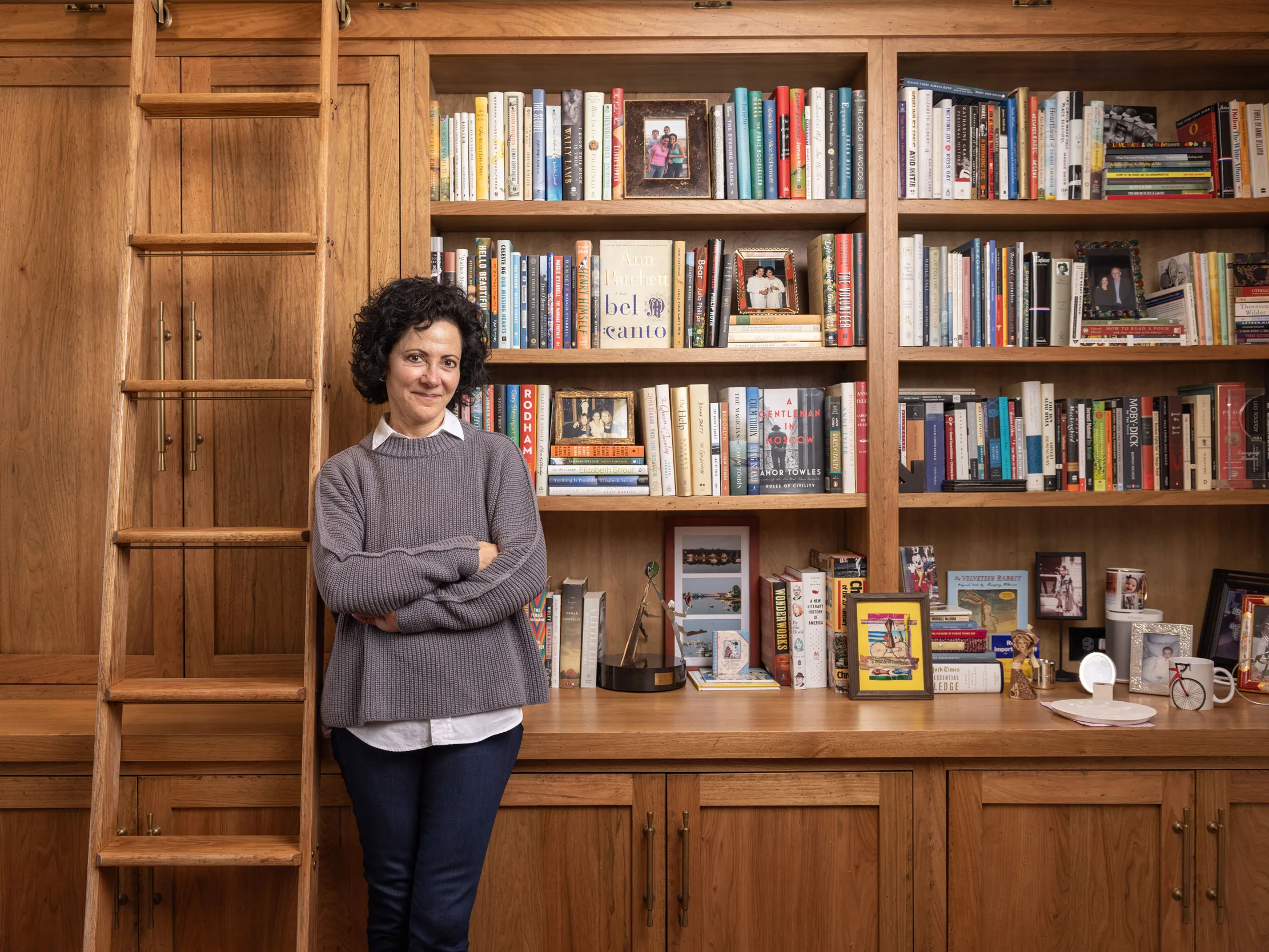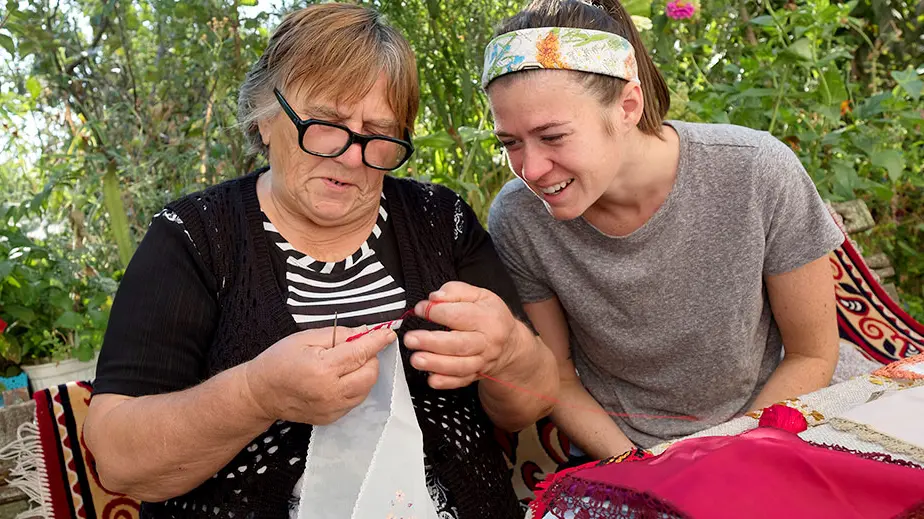
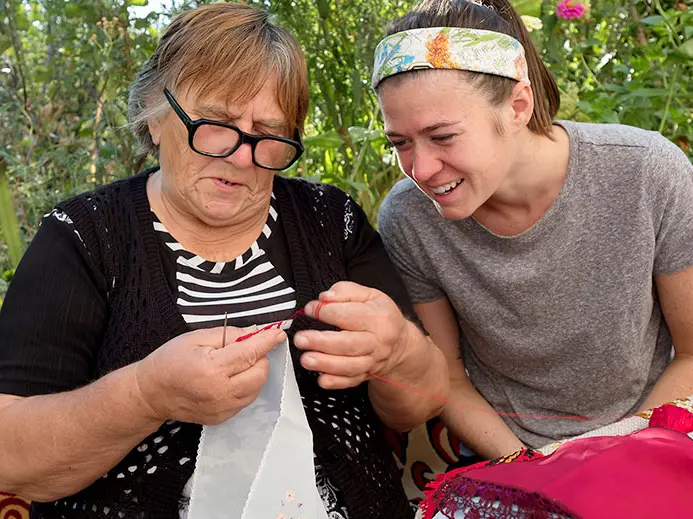
Listening for lore and finding connections
The tiny Bulgarian village where folklorist Sarah Craycraft ’13 put down roots reminds her of the corner of Appalachian Ohio she calls home. This doctoral student takes lessons — and listens — in both places as she considers how to tie the regions’ rich and intricate pasts to futures yet to be imagined.
This is a big day for the Bulgarian village of Sinagovtsi, especially for four young women who have spent the past three weeks as guests of grandmothers in the community.
Welcomed, sheltered and embraced by their adopted village, the visitors have prepared as a thank-you gift a full day of events at the chitalishte, the village library and cultural center.
Plans include an exhibition of historical items followed by a community talent show and an open-air movie screening. As villagers make their way toward the dilapidated chitalishte, a tall, slender woman in a dark blue flowered dress welcomes them. “Zdraveite, zapovyadaite,” she says warmly. “Hello, welcome.”
This is Sarah Craycraft ’13, an Ohio State doctoral student in comparative studies with a specialization in folklore. She and her peers are taking part in a rural rejuvenation program known as the Baba Residence, or Granny Residency. The project connects elderly villagers from across Bulgaria with young people living in the country’s urban areas to connect generations and preserve waning traditions. Craycraft is the first person from outside Bulgaria to be selected in the program’s five years and the sole trained folklorist among this year’s 20 participants. A native of southern Ohio’s Brown County, on the edge of Appalachia, she is well schooled in rural life.
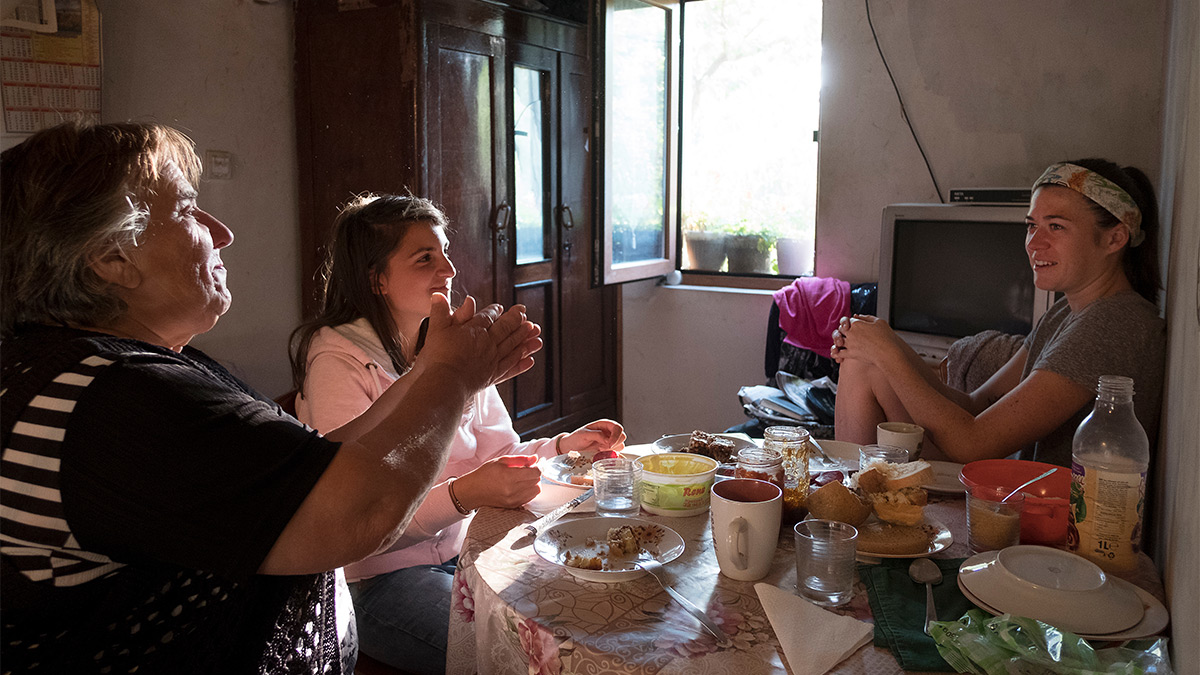
As Craycraft explains the exhibition to new arrivals, an older woman in a bright purple jacket stumps toward her with a serious look. “Sarah, you did not have anything for breakfast, dear!” The woman’s expression melts to a smile and Craycraft introduces Baba Tsetsa, as villagers know her host, Tsvetana Todorova. The two launch into an animated conversation about the traditional handiwork spread across the room’s long tables, turning special attention to Baba Tsetsa’s creations.
“She has hundreds of tablecloths and aprons for traditional costumes,” Craycraft boasts. “She’s made many, and her mother made many more. There are beautiful things tucked in the cupboards that nobody is using, because they are not for use, they are for memories.”
Reviving those memories has been among the most important gifts the young women have given Sinagovtsi, where time seems to have stopped. As in most of rural Bulgaria — which supported half of the country’s population in 1970, but only about 20 percent now — a lack of work drove the village’s youth away years ago. Some moved abroad, others to cities. The loss led to the closing of village schools as well as the clinic, post office and most shops, leaving the chitalishte and a local café as the only centers of community.
The young women participating in the residency worked with locals and the chitalishte manager to explore how they could assist. They held a town meeting and spoke with some 30 residents about the history and traditions of Sinagovtsi and what could be improved while they were there. The participants found unlikely allies in the visiting grandchildren of villagers. Most summers, the children are consumed with play and their grandmothers’ cooking, but Craycraft and her friends have other plans for the youngsters this time.
Back at the celebration, Craycraft also shares a piece of home. For the talent show, she and a local teenager planned to sing together, but the boy is running late. Craycraft takes the stage and says in clear Bulgarian: “I wanted to sing a Bulgarian song, but my partner is not here. So I will perform a song famous in my region, Appalachia, a place with a lot of mountains.”
“I’m a long time traveling here below.
I’m a long time traveling away from home …”
It’s a risky move, but it succeeds. Craycraft leaves the stage to heavy applause, and her act has inspired others. One after another, locals stand and perform. Some sing famous Bulgarian folk songs, others renditions of poetry. A very old woman in a funeral gown stands last. She is a retired teacher and respected elder. With a trembling voice, she recites a poem dedicated to her late husband, Ivan, bringing some in the audience to tears. Before she leaves the stage, the old woman says, “These are not girls, they are angels! They brought me so much happiness and lightened my pains.”
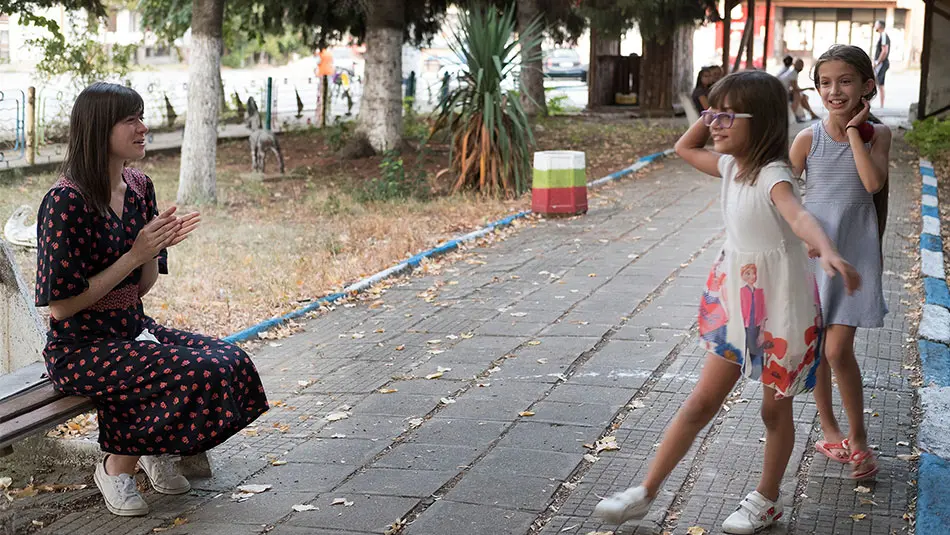
Craycraft and other young women involved in the Baba Residence invested their time in people and service during their three-week stay. That included playing with residents’ grandchildren.
“For them, we were a sort of an enigma, doing something different. So we asked if they wanted to help us a little to clean the square,” says Craycraft, who won the kids’ respect — and the nickname “Sarah the Ninja” — with her mastery of hide and seek. “We managed to build a relationship by helping each other. We helped them cut the grass of the soccer field next to the church, and they helped us with painting the chitalishte benches.”
Chitalishte manager Daniela Georgieva is a huge fan of the residency participants.
“I can only say good things about them, and I am sure I am speaking on behalf of the entire village. The motto of the residency is about building a bridge between the generations. I can assure you they succeeded in building a very solid bridge indeed,” Georgieva says. “Since the girls came, they managed to open each door, to talk to absolutely everyone in the village, including people who rarely communicate with the rest. Wherever they went, they spread love, smiles and goodness.”
“I can only say good things about them, and I am sure I am speaking on behalf of the entire village. The motto of the residency is about building a bridge between the generations. I can assure you they succeeded in building a very solid bridge indeed.”
One aim of the residency is to provide assistance to local grandmothers, or babi, but Todorova sought little of that from Craycraft and her residency roommate. Asked why she is not letting them work more in her garden, she brushes the question aside, saying she is used to taking care of her small plot of land by herself. Her two adopted granddaughters are doing enough, both for her and the village.
“They are very tired, the poor souls. They worked so much, cleaned so much. They helped me a lot. We moved the chopped wood, cleaned the garden …” While we talk at a small table in her yard, she casually sends Craycraft to pick figs from the high branches of a nearby tree. “She is tall,” Todorova says. “I can’t reach that high.”
Craycraft returns and shares her views. “Nelina, the girl I live with at Baba Tsetsa’s, and I thought we would work in her house much more. We were ready to help with weeding and gardening, but things didn’t work that way,” she says. “Every time we tried to help more, she would say, ‘Sit, sit, eat more!’ We had to sneak work or beat her to the sink to wash the dishes. But I think it meant much more to her to have people around to tell her stories to.”
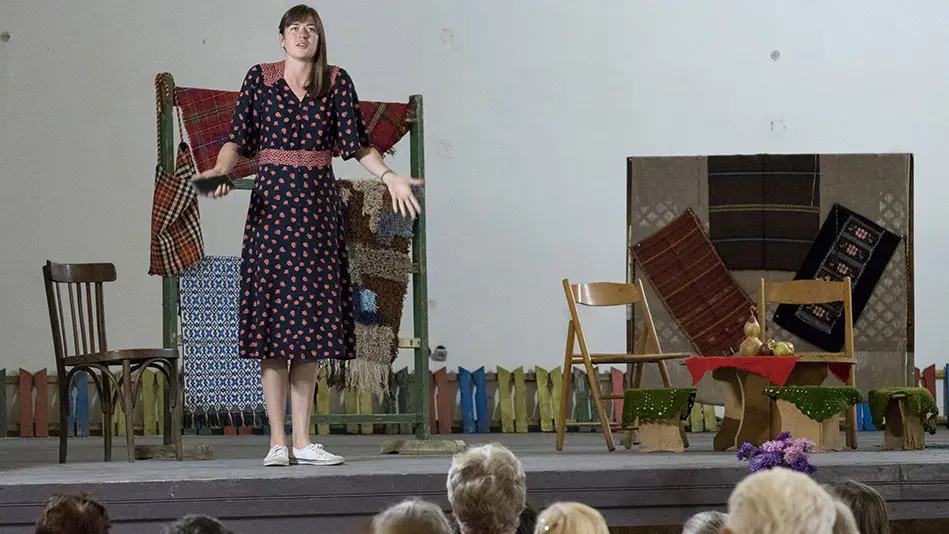
When her duet partner was late for their performance at a community gathering, Craycraft improvised by sharing a song she learned growing up in southern Ohio.
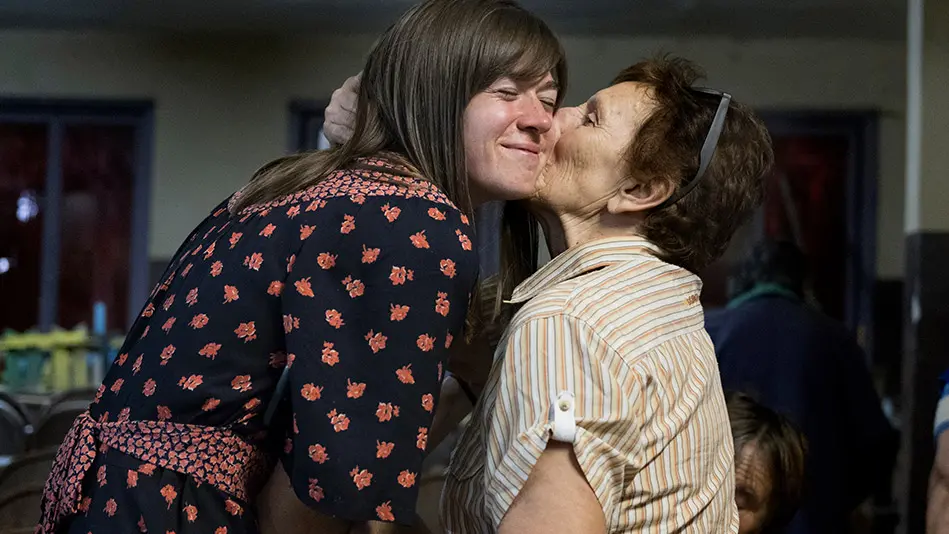
A resident of Sinagovtsi shows Craycraft appreciation on the night of a celebration at the chitalishte.
After a quick week at home in southern Ohio to visit family and enjoy her own mother’s cooking, Craycraft is back in Bulgaria for another year of field work. She is thinking about what she will want to bring home on her next return.
“If I could export anything from Bulgaria to the U.S. it would be the chitalishte. We don’t have such a thing. It’s the cultural heart and soul of the village and smaller cities. It is a place of learning and sharing, and it typically deals with traditional culture. I think it is replicable in some ways,” she says. “In small-town Ohio there are Rotary clubs or Veterans of Foreign Wars posts that host events for the community. But there has been a decline in those as the generation that fostered these kinds of gatherings is vanishing.”
Craycraft envisions conversations in her future — in Bulgaria, in southern Ohio, in Columbus with the respected folklore faculty who drew her to Ohio State. But it’s not time for those yet.
“I’m listening right now. I’m at the very beginning of the field work. I have my experiences in my head. I know what I want to look at in Bulgaria, but I am very much at that stage of listening very, very carefully before I speak too much. I don’t want my experiences to stay with me; I want them to have some type of public output.”
In the meantime, the coming year in Bulgaria will allow her to stay connected with Sinagovtsi. She will always have a place there, Baba Tsetsa confirms. “They can come to visit me every time they like. They should just call me the day before so I can cook, and there will be no problem!”
“Sarah’s host, Baba Tsetsa, accepted her as if she was her own granddaughter. This is the biggest and most ostensible benefit of the Baba Residence, which is very hard to measure — the emotional impact it has both on locals and participants.”
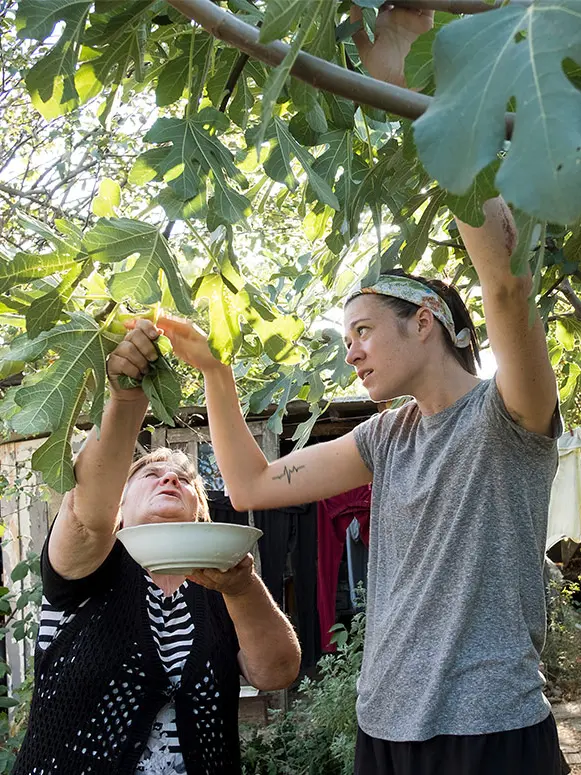
Craycraft and Todorova pick figs from a tree in Todorova’s yard.
‘I carry these lessons with me’
Sarah Craycraft takes us on her journey from southern Ohio to Columbus to Bulgaria, sharing inspirations and inklings of what is to come.
I grew up in southern Ohio, a first-generation college student initially intimidated by the scale of Ohio State. Yet I soon found myself at home in Columbus, and I hit my stride after an education abroad experience and a decision to focus my studies on the social and cultural issues of my home region of Appalachia. I remember thinking at graduation, on a sunny May day in the ’Shoe, that I could barely believe the future staring me down was my own: Small-town Sarah was preparing for a year in Bulgaria as a Fulbright English teaching assistant.
When I flew to Eastern Europe later that year, unnerved by the unfamiliarity of my chosen path, I felt like a freshman facing her first undergraduate class all over again. Yet I realized my studies had equipped me for this new challenge. Coursework in narrative theory and regional America with folklorists and professors Amy Shuman and Dorothy Noyes had prepared me to engage deeply with the cultural and community-based aspects of being in a new place.
I found folklore — with its emphasis on creative expression, everyday life and often marginalized perspectives — to be an excellent lens for understanding this new environment. It had done the same when I was an undergraduate, offering me new insights into the region surrounding my hometown of Mount Orab, Ohio. My Ohio State mentors encouraged me to take notes on my experiences and continued to support me from afar.
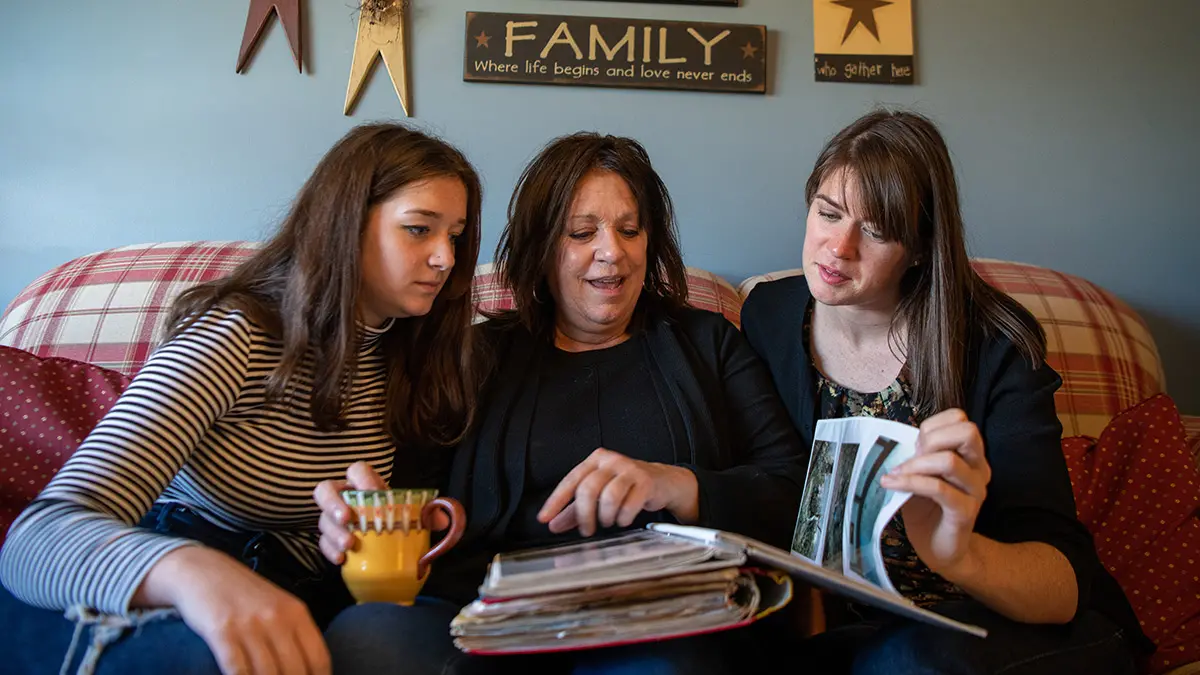
Sisters Brookelyn Duncan (left) and Sarah Craycraft reminisce with their mom, Connie, at the family home in Mount Orab, Ohio. (Photo by Jo McCulty)
Now, six years later, I see the immense possibilities that cross-cultural perspectives can open up, and that realization has shaped my ethnographic work. As I write this, I am preparing for another year in Bulgaria, now as a fourth-year comparative studies doctoral student seeking a better understanding of rural rejuvenation and the young people who take part in this work.The Ohio Field School at Ohio State prepared me for this quest, and it affected the trajectory of my research more than any other college experience. This ongoing research initiative and ethnographic methods course offered by the university’s Center for Folklore Studies focuses on Ohio communities’ responses to a changing environment by documenting everyday practices and expressive culture.
Beyond the many practical and technical skills I gained through the field school, my greatest takeaway came from the project’s emphasis on listening. Our leaders, Katey Borland and Cassie Patterson ’09 MA, ’15 PhD, modeled attentive and responsible listening through their commitment to including community members in all aspects of project planning and implementation. I carry these lessons with me — to work in partnership with communities, to listen deeply before imposing my own frameworks upon situations I observe, and to think comparatively.
In my work with the people of Bulgaria, I often think of home and the revelations that rural Bulgaria and Appalachian Ohio might share. For instance, I see that Bulgarians maintain strong relationships with both urban and rural spaces, and I admire how young Appalachians create media projects to share their stories and perspectives more broadly. Ultimately, with my doctoral studies complete, I envision sharing with others these places I have called home. I am excited to imagine more concrete ways to make the stories I hear in both spaces legible across international boundaries.
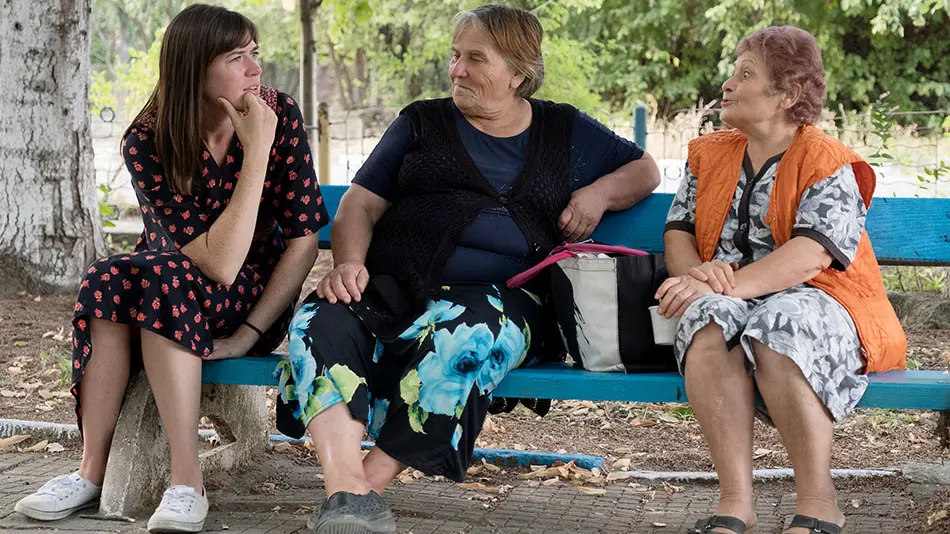
Craycraft connects with villagers. This and other interactions are all part of the way young women involved with the Baba Residence invest their time in people and service during their stay.


